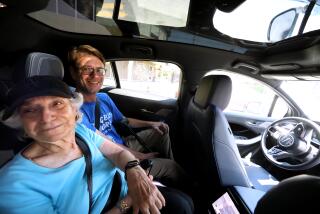Google Glass through the eyes of an early adopter [Video]
- Share via
In the last month, Google has been handing out the first editions of its much-anticipated Glass wearable computer devices to a select group chosen to try it out.
One of them was avid bicyclist and science-fiction writer Margo Rowder, who was invited to pick up the high-tech eyewear at a Google office in Los Angeles. All those selected to buy the glasses must pick them up at a Google office and go through a Google initiation-like process.
Rowder allowed me to tag along and experience the whole process with her.
She applied to receive an invitation to the Google Glass Explorer program in February, telling Google she was interested in using the device to help her get around Los Angeles on her bike.
PHOTOS: Tech giants’ new headquarters
In her application, Rowder also said Glass would make it easier for her to record any thoughts that came to her that would be useful for the book she is writing called “Thirty Decibels,” which is about a futuristic society where most people are forbidden from speaking any louder than a whisper. Rowder said she was very excited to receive her invitation to purchase the $1,500 glasses because in her book, which she began writing in 2009, she imagined a device that’s very similar to what Google has made.
Riding on her blue Raleigh hybrid bike, Rowder pulled up Wednesday afternoon to Google’s offices in Venice, located inside the Binoculars Building, designed in the 1980s by architect Frank Gehry.
Inside we were greeted by half a dozen Google employees, all wearing Glass.
After Rowder finished putting on her contact lenses (you can’t wear prescription eyeglasses while using Glass) we were escorted to the Glass team’s wing of the building. Along the way we got an inside peek of what employees have access to: a Google L.A.-imprinted burgundy pool table, a large snack room and an open courtyard complete with a human-size chess board.
The team’s room looked like an Apple store that had been converted into a theater dressing room with vanity mirrors. On one side were counters with numerous glasses in various colors, and on the other, were vanity tables with black bags labeled with the “Glass” logo. Google’s staffers offered drinks and hors d’oeuvres.
Rowder had no interest in the white, black or gray glasses and instead focused on those that were in orange (tangerine) and blue (sky).
PHOTOS: Top music subscription services
Glass is essentially made up of five parts: a titanium frame, two nose pads that hold up the frame, a counterweight on the back right side of the device, the main component which sits next to the right temple of a user’s face and doubles as a touch pad, and a glass cube, which houses the tiny screen.
Once she picked out her color, Rowder was taken to one of the vanity tables, where she was presented with an encyclopedia-sized white box. She opened the box slowly, hoping to take in the full experience like a tech geek unboxing a new device. Once she got to the Glass, she lifted the device and examined it before putting on her very own head-mounted display for the first time.
Pat, a Google Glass team member, asked Rowder how the device felt before giving her tips on the proper way to wear it: The frame should sit straight across her brows and once she turns it on, she should be able to see the screen in the glass unimpeded.
“Oh I see it,” she said.
“You see the screen already?” Pat asked her.
“Yeah,” Rowder said with an excited chuckle.
Another Glass staffer asked if I would like to try on the device. We went to the stand and I picked out the shale gray model -- I’ve always gone with dark and cool colors when it comes to my devices.
PHOTOS: Top smartphones of 2013
After putting it on and turning it on, I had to tap the touchpad on the main device (quickly tilting your head 30 degrees also works) to bring up a floating screen with a transparent “OK Glass” written across it. It was like looking through a heads-up display on a fighter jet.
Along with “OK Glass” the see-through screen displayed the time of day. The display of “OK Glass” signaled that I could give it commands, to take a picture for instance.
“OK, Glass, take a picture,” I instructed, and the device snapped a photo, which I could see immediately on my display screen.
With the touch pad, I could scroll the screen left or right using a finger. Scrolling to the left displayed various information, including weather. Scrolling to the right, I found the picture I had just taken.
After a few minutes, my eyes were beginning to strain -- I felt a little bit overwhelmed by the new technology -- so I took it off and handed it back to the staffers.
I rejoined Rowder as Pat helped her set up the smartphone app that works with Glass, check out the website where she can adjust Glass’ settings, and add Glass apps (or Glassware as they are officially called). Rowder tried out all Glass’ functions, shooting video of us, searching images of actress Julia Roberts and sending her first Glass-written text message.
“Hi mom I’m talking to you from Glass. What do you think!?” Rowder said aloud, specifying the punctuation marks, which Glass transcribed, turned to text and sent to her mom.
After about half an hour spent setting up the device, Rowder was finally good to go. The Glass team walked us out and gave her as much information as they could before we said our goodbyes, like a couple of parents sending their daughter off to college for the first time.
Outside, Rowder popped on the sun visors that came with the Glass, put on her helmet, and hopped on her bike. For a moment, though, she seemed in an odd daydream-like state as she tried to get the Glass to give her directions.
I told my colleagues all about this weird instance that must surely happen to all Glass users as they scroll through their device looking for information. We came up with a term for it: Glass-eyed, as in, “That girl’s totally Glass-eyed right now.”
ALSO:
HTC One running ‘stock Android’ coming June 26
Fanhattan unveils radically different approach to cable boxes
Apple sells 100 million iPod Touch devices, offers $229 model






